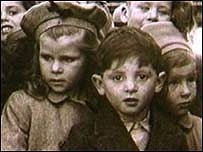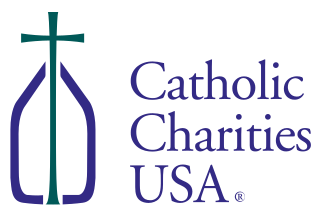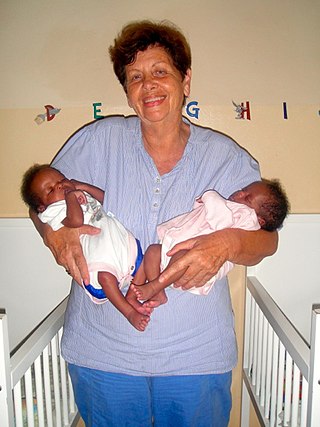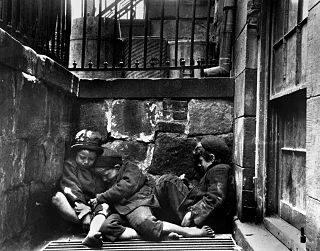
The Angel Guardian Home, formerly the Angel Guardian Home for Little Children is a Catholic orphanage in the Dyker Heights area of Brooklyn, New York.

The Angel Guardian Home, formerly the Angel Guardian Home for Little Children is a Catholic orphanage in the Dyker Heights area of Brooklyn, New York.
The Angel Guardian Home for Little Children was founded in 1899 [1] by the Sisters of Mercy [2] as a sister facility to the order's other New York orphanage, St. Mary's of the Angels Home, which had opened five years earlier in Syosset, New York. [3]
The Angel Guardian Home, on 12th Avenue and 64th Street in Brooklyn, had been taking in orphans since 1863. It served as a further extension of the Convent of Mercy, which was then at 237 Willoughby Avenue. The first child intakes of the Angel Guardian home were sixty young girls aged two to five[ citation needed ]. In 1903, the Home began accepting young boys as well, and in 1906, a nursery was built so the Home could begin accepting infants. In 1906 the Angel Guardian Home also began foster care placements for their residents. In 1946, a formal adoption program was started. In 1975, the Home opened its first off-site group residence home for teenage mothers and their children. [4]
In 2003, the administrations of Angel Guardian Home and St. Mary’s of the Angels Home merged to form the MercyFirst network of agencies.
Following a decision by the Sisters of Mercy to sell the Angel Guardian Campus, MercyFirst moved its offices from Angel Guardian to Industry City in Sunset Park on September 1, 2017. Plans to sell the property remain with the hope that it can be used to benefit the community by possibly being developed to offer Senior Housing. Individuals formerly cared for or adopted through Angel Guardian can still request a search of the files and records by contacting MercyFirst.[ citation needed ]
In 1977, New York City Comptroller Harrison Goldin performed an audit of New York City's private foster-care agencies based on a random sampling of five, of which the Angel Guardian Home was one, and issued a stinging report summarizing the findings, alleging that the agencies were essentially warehousing children, and making little if any effort to find permanent homes for them. The report, titled "The Children Are Waiting: The Failure to Achieve Permanent Homes for Foster Children in New York City", detailed how none of the five foster-care agencies, including Angel Guardian, provided services to biological parents to reclaim their children after they had been placed in foster custody, none put children up for adoption in a reasonable time frame after they had been legally certified as adoptable, and none made prompt moves to have children certified as adoptable even though they had been obviously abandoned by their parents, in some cases for years. [5]
In the 1990s, other criticisms surfaced that the Angel Guardian Home was indifferent to the individual needs of children in its custody. Dorothy E. Roberts, professor at Northwestern University School of Law, detailed a case of Gladys S., who had had her five children taken into foster care for reasons of poverty, only met with opposition and hostility when she attempted to fulfill the testing obligations required for her to reclaim her children from foster care at Angel Guardian. [6]
Baby farming is the historical practice of accepting custody of an infant or child in exchange for payment in late-Victorian Britain and, less commonly, in Australia and the United States. If the infant was young, this usually included wet-nursing. Some baby farmers "adopted" children for lump-sum payments, while others cared for infants for periodic payments.

An orphanage is a residential institution, total institution or group home, devoted to the care of orphans and children who, for various reasons, cannot be cared for by their biological families. The parents may be deceased, absent, or abusive. There may be substance abuse or mental illness in the biological home, or the parent may simply be unwilling to care for the child. The legal responsibility for the support of abandoned children differs from country to country, and within countries. Government-run orphanages have been phased out in most developed countries during the latter half of the 20th century but continue to operate in many other regions internationally. It is now generally accepted that orphanages are detrimental to the emotional wellbeing of children, and government support goes instead towards supporting the family unit.

Foster care is a system in which a minor has been placed into a ward, group home, or private home of a state-certified caregiver, referred to as a "foster parent", or with a family member approved by the state. The placement of a "foster child" is normally arranged through the government or a social service agency. The institution, group home, or foster parent is compensated for expenses unless with a family member. In some states, relative or "Kinship" caregivers of children who are wards of the state are provided with a financial stipend.

The Company of the Daughters of Charity of Saint Vincent de Paul, commonly called the Daughters of Charity or Sisters of Charity of Saint Vincent De Paul, is a Society of Apostolic Life for women within the Catholic Church. Its members make annual vows throughout their life, which leaves them always free to leave, without the need of ecclesiastical permission. They were founded in 1633 and state that they are devoted to serving the poor through the corporal and spiritual works of mercy.
Disruption is ending an adoption. While technically an adoption is disrupted only when it is abandoned by the adopting parent or parents before it is legally completed, in practice the term is used for all adoptions that are ended. It is usually initiated by the parents via a court petition, much like a divorce, to which it is analogous.

Beulah George "Georgia" Tann, was an American child trafficker who operated the Tennessee Children's Home Society, an adoption agency in Memphis, Tennessee. Tann used the unlicensed home as a front for her black market baby adoption scheme from the 1920s. Young children were kidnapped and then sold to wealthy families, abused, or—in some instances—murdered. A state investigation into numerous instances of adoption fraud led to the closure of the institution in 1950. Tann died of cancer before the investigation made its findings public. Tann's custom of placing children with influential members of society normalized adoption in the U.S., and many of her adoption policies have become standard practice.

Catholic Charities is a network of charities with headquarters in Alexandria, Virginia. In 2005, Forbes magazine ranked it as the fifth largest charity in the United States in terms of total revenue. The organization serves millions of people a year, regardless of their religious, social, or economic backgrounds. In 2019, 12 million persons were served at more than 2600 locations. Next to the federal government, Catholic Charities is the largest US social-safety-net provider.
Tennessee Children's Home Society was a chain of orphanages that operated in the state of Tennessee during the first half of the twentieth century. It is most often associated with Georgia Tann, its Memphis branch operator and child trafficker who was involved in the kidnapping of children and their illegal adoptions.

The Orphan Train Movement was a supervised welfare program that transported children from crowded Eastern cities of the United States to foster homes located largely in rural areas of the Midwest. The orphan trains operated between 1854 and 1929, relocating from about 200,000 children. The co-founders of the Orphan Train movement claimed that these children were orphaned, abandoned, abused, or homeless, but this was not always true. They were mostly the children of new immigrants and the children of the poor and destitute families living in these cities. Criticisms of the program include ineffective screening of caretakers, insufficient follow-ups on placements, and that many children were used as strictly slave farm labor.

The New York Foundling, founded in 1869 by the Roman Catholic Sisters of Charity, is one of New York City's oldest and largest child welfare agencies. The Foundling operates programs in the five boroughs of New York City, Rockland County, and Puerto Rico. Its services include foster care, adoptions, educational programs, mental health services, and many other community-based services for children, families, and adults.
The Dominican Sisters of Blauvelt are a religious congregation within the Dominican Order of religious sisters founded in 1890. They are based in the town of Blauvelt, New York, a northern suburb of New York City. Their traditional service has been childcare, both through teaching and caring for orphans.

Forestdale, Inc. is a non-profit agency that provides foster care, preventive and other family services in New York City. It is located in the Forest Hills section of Queens.

Annie Chikhwaza is a Dutch missionary known as a 'Mother of Malawi' for her work with orphans in Africa through Kondanani Children's Village, an NGO, which has been called "a five star orphanage" and "a centre of excellence" in a Channel 4 documentary. Many of the orphans are survivors of HIV/AIDS and Chikhwaza has built a village at Bvumbwe in Thyolo District of Malawi which includes an infant care facility, children's homes, nursery school, primary school and farm.

Foster care is the term used for a system in which a minor who has been made a ward is placed in an institution, group home, relative placement, or private home of a state certified caregiver. The placement of the child is usually arranged through the government or a social-service agency. The institution, group home, or foster parent is paid.

Adoption in the Philippines is a process of granting social, emotional and legal family and kinship membership to an individual from the Philippines, usually a child. It involves a transfer of parental rights and obligations and provides family membership. The Department of Social Welfare and Development (DSWD) defines adoption as a "socio-legal process of giving a permanent family to a child whose parents have voluntarily or involuntarily given up their parental rights."

The Colored Orphan Asylum was an institution in New York City, open from 1836 to 1946. It housed on average four hundred children annually and was mostly managed by women. Its first location was on Fifth Avenue between 42nd and 43rd Streets in Midtown Manhattan, a four-story building with two wings. It later moved to Upper Manhattan and then to Riverdale in the Bronx.
Catholic Guardian Services (CGS) is a human services non-profit organization sponsored by the Catholic Charities of the Archdiocese of New York with programs to help members of the disadvantaged population in the New York metropolitan area.
Lily Nie is the founder of Chinese Children Adoption International, which has overseen the international adoptions of over 10,160 Chinese children. She was inducted into the Colorado Women's Hall of Fame in 2008.
During the Russian invasion of Ukraine, Russia has forcibly transferred thousands of Ukrainian children to areas under its control, assigned them Russian citizenship, forcibly adopted them into Russian families, and created obstacles for their reunification with their parents and homeland. The United Nations has stated that these deportations constitute war crimes. The International Criminal Court (ICC) has issued arrest warrants for President of Russia Vladimir Putin and Children's Rights Commissioner Maria Lvova-Belova for their alleged involvement. According to international law, including the 1948 Genocide Convention, such acts constitute genocide if done with intent to destroy, in whole or in part, a nation or ethnic group.
{{cite book}}: CS1 maint: multiple names: authors list (link)